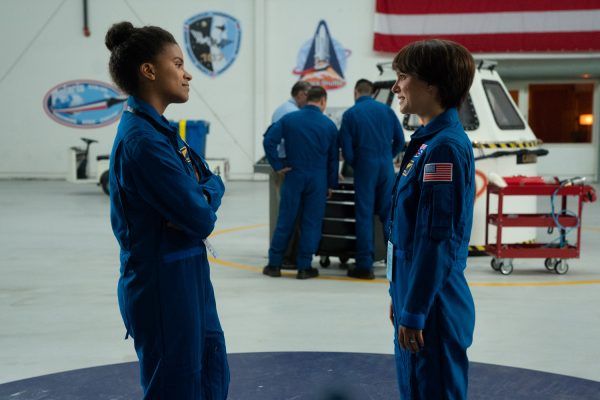This is a re-post of our Lucy in the Sky review from the 2019 Toronto International Film Festival. The movie is now playing in limited release.
Lucy in the Sky, the feature film debut of Noah Hawley (the creator of the TV series Fargo and Legion), has an interesting and compelling starting point. Most of us will never go to outer space in our life times. At this point in our history, that honor is reserved for a select few, and being able to touch the cosmos has to transform you in some kind of way. Hawley ponders what that kind of experience would do to someone after you return to Earth, and then just spends about 80 minutes musing on it before he just shrugs, rips a story from the headlines, and pops in a conclusion that’s as good as any other. It’s a movie that feints at being invested in the emotional lives of women, but really just can’t get past its premise.
Lucy Cola (Natalie Portman) is awed by her recent trip into space, and when she returns to Earth, everything seems smaller and far away. She’s anxious to return to the cosmos in an upcoming NASA mission to reclaim that unique high and deal with her existential crisis. Her solution while on Earth is to cheat on her sweet, inoffensive husband Drew (Dan Stevens) with NASA’s resident bad boy Mark Goodwin (Jon Hamm). But as Lucy competes with another candidate (Zazie Beetz) and starts losing Mark’s attention, she starts to unravel, driven by a compulsive need to get back to a place where things have meaning.
Noah Hawley has a habit, which you can see on Legion, of trying to use the visuals to explain the mental states of the characters, but doing it in such a way that the character ends up getting overshadowed by the stylistic flourishes. The medium takes over the message and so you’re constantly paying attention to how the message is being conveyed rather than the message itself. He does that again here as he plays with aspect ratios (the Earthbound stuff is mostly shot in 4:3 to make it seem smaller; you know, because the world seems smaller now to Lucy; so clever) and camera tricks to show Lucy’s alienation.
But Hawley uses these moves so often that their impact is severely diminished. Instead, they play as a director not willing to trust his audience with the emotion of the narrative. He has a top-class talent in Portman, and rather than letting her performance carry the film, he surrounds her with overcooked visuals that bring us no closer to understanding her mental state beyond, “She is having an existential crisis and wants to go back to space.” All of the relationships are rendered in the broadest possible strokes, so while you may not know the specific details of Lucy’s relationship with her hard-ass mother (Ellen Burstyn), you’ll know that when the mom ends up in the hospital we need to do a double dolly shot so you can see the Lucy feels untethered from reality. For a filmmaker who puts so much effort into the visuals, Hawley’s choices often feel obvious.
Where the film really starts getting icky (and I suppose this is spoiler territory so stop reading now if you want to avoid that stuff) is where Hawley then picks up the story of Lisa Nowak, the “sad astronaut” who in 2007 was arrested for the attempted kidnapping of engineer Colleen Shipman, who was sleeping with Nowak’s lover and fellow astronaut William Oefelein. The film says in its opening, “Inspired by True Events”, but this inspiration seems fairly crass and clumsy as it takes the broad notes from Nowak’s story and then uses them to show Lucy reaching a breaking point. The film didn’t need to echo the beats of Nowak’s story, and there’s also not much sympathy in Hawley’s telling beyond showing a person who goes to space and then tries to recapture that thrill back on Earth. To use Nowak’s story so casually makes its presence come off as exploitative. Rather than showing genuine concern for Nowak, her story just becomes dramatic fodder, which in turn reduces any claim the film may have for getting us to care for Lucy’s struggle.
Hawley has a good starting point, but he didn’t work to take it in any direction beyond some vague existential despair, and even that feels a little cheap and underdone. Tangible, emotional moments to show Lucy’s unraveling could have a great impact like seeing her grow apart from Drew and making us feel the loss of their marriage. The film could have been darker and shown how Lucy feels indifferent towards the issues we give weight here on Earth (instead, she talks about how we don’ appreciate sunsets and sunrises enough). Hawley’s movie just meanders around and then tries to dazzle us with some pretty visuals. Far from the awe of the cosmos, Lucy in the Sky is crushingly mundane.
Rating: C-
Lucy in the Sky opens October 4th.



